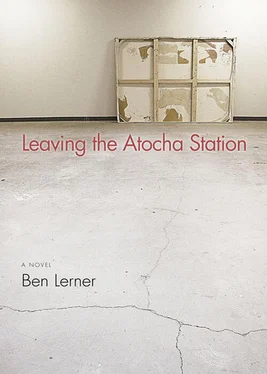__________________________
We tended to wake at the same time, Isabel and I, which gave us the sense of having been awoken by something, a noise external or internal to our dreams, and we listened, facing each other, blinking, for the noise to recur, which it didn’t, although I never mentioned this idea about the noise to her, so she might not have had the experience I ascribed her. She would get out of bed and wrap herself in the towel that was always draped across the chair, then shower while I put on the coffee. When the coffee was ready I would say so loudly enough that she could hear me over the water and she would turn off the water and rewrap herself in the towel and we’d take our coffee on the couch and smoke, moving the little butane heater close to us. Then I showered and did the things I didn’t do in front of her: shit, take pills, and when I came out of the bathroom she would be dressed, putting up her hair.
She was always wrapping or unwrapping her hair or body in some sort of cloth, winding or unwinding a shawl or scarf, and whenever I imagined her, I imagined her engaged in one of these activities; I couldn’t picture her standing still, fully dressed or undressed, but only in the process of gracefully entangling or disentangling herself from fabric. I tried to tell her this, as I thought it would sound poetic, but I didn’t have any of the relevant verbs, so I said something about not having the words to describe how she was always moving, how I couldn’t imagine her still, and I made a series of gestures that communicated this was a pale version of what I had intended to communicate, and left her to unfold my meaning.
Except for our most basic exchanges, pass me this or pass me that, what time is it, and so on, our conversation largely consisted of my gesturing toward something I was powerless to express, then guessing at whatever referent she guessed at, and gesturing in response to that. In this, my project’s second phase, Isabel assigned profound meaning, assigned a plurality of possible profound meanings, to my fragmentary speech, intuiting from those fragments depths of insight and latent eloquence, and because she projected what she thought she discovered, she experienced, I liked to think, an intense affinity for the workings of my mind.
As we walked through the Reina Sofía I would offer up unconjugated sentences or sentence fragments in response to paintings that she then expanded and concatenated into penetrating observations about line and color, art and institutions, old world and new, or at least I imagined those expansions; To photograph a painting—, I said with derisive mystery as we watched the tourists in front of Guernica, and then I observed her face as this phrase spread out into a meditation on art in the age of technological reproducibility. I would say, Blue is an idea about distance, or Literature ends in that particular blue, or Here are several subjunctive blues; I would say, To write with sculpture—,To think the vertical—, To refute a century of shadow—, etc., and watch her mouth the phrase to herself, investing it with all possible resonances, then reapplying it to canvas. Of course we engaged in our share of incidental talk, but our most intense and ostensibly intimate interactions were the effect of her imbuing my silences, the gaps out of which my Spanish was primarily composed, with tremendous intellectual and aesthetic force. And I believe she imbued my body thus, finding every touch enhanced by ambiguity of intention, as if it too required translation, and so each touch branched out, became a variety of touches. Her experience of my body, I thought, was more her experience of her experience of her body, of its symphonic receptivity, ridiculous phrase, and my experience of my body was her experience once removed, which meant my body was dissolved, and that’s all I’d ever really wanted from my body, such as it was.
Isabel did not own a car but there were apparently several cars to which she had access; weekends during the winter of my project she would drive us out of Madrid in a small red car, a small yellow car, or a brown station wagon to whatever nearby town might have a church or restaurant or relative of interest. She seemed to have innumerable aunts and cousins and, after visiting relics or yet another El Greco or eating partridge, baby pig, or some other regional delicacy lately slain, we would meet up with her family, smoke, and drink. I had been in Spain long enough that when I met her relations I felt compelled to appear more shy and reticent than monolingual; luckily, this was an impression it was easy to give, for as long as I remembered to change my expression in keeping with the tone of whoever was declaiming, I could affect comprehension, and if I spoke very quietly when I had to speak, and if I smoked a little sullenly, no one attempted to enlist me in conversation. This worked with everybody except her Aunt Rufina.
It was sunny but very cold on the day we drove to Toledo and I sensed from Isabel’s manner that her relationship with Rufina was complex, at least she kept thinking out loud about whether we should in fact visit Rufina after walking around the city, if we would have time or if she might be busy, whereas we normally just showed up at one of her relations’ houses or apartments, no matter the hour, and were absorbed with a flurry of kisses into whatever they were doing, usually drinking and watching TV. On the highway to Toledo we passed several tour buses full of what looked like Americans, digital cameras already in hand, and as we drew past them I expressed infinite disdain, which I could do easily with my eyebrows, for every tourist whose gaze I met. My look accused them of supporting the war, of treating people and the relations between people like things, of being the lemmings of a murderous and spectacular empire, accused them as if I were a writer in flight from a repressive regime, rather than one of its most fraudulent grantees. Indeed, whenever I encountered an American I showered him or her with silent contempt, and not just the loud, interchangeable frat boys calling each other by their last names, calling each other fags, and the peroxided, inevitably miniskirted sorority girls spending their junior year abroad, dividing their time between internet cafés and discotecas, complaining about the food or water pressure in the households of their host families, having chosen Spain over Mexico, where Cyrus was, because it was safer, cleaner, whiter, if farther from their parents’ gated communities. I had contempt not just for the middle-aged with their fanny packs and fishing hats and whining kids, or the barbate backpackers who acted as though failing to shower were falling off the grid; rather, I reserved my most intense antipathy for those Americans who attempted to blend in, who made Spanish friends and eschewed the company of their countrymen, who refused to speak English and who, when they spoke Spanish, exaggerated the peninsular lisp. At first I was unaware of the presence in Madrid of these subtler, quieter Americans, but as I became one, I began to perceive their numbers; I would be congratulating myself on lunching with Isabel at a tourist-free restaurant, congratulating myself on making contact with authentic Spain, which I only defined negatively as an American-free space, when I would catch the eyes of a man or woman at another table, early twenties to early thirties, surrounded by Spaniards, reticent compared to the rest of the company, smoking a little sullenly, and I knew, we would both know immediately, that we were of a piece. I came to understand that if you looked around carefully as you walked through the supposedly least touristy barrios, you could identify young Americans whose lives were structured by attempting to appear otherwise, probably living on savings or giving private English lessons to rich kids, temporary expatriates sporting haircuts and clothing that, in hard-to-specify ways, seemed native to Madrid, in part because they were imperfect or belated versions of American styles. Each member of this shadowy network resented the others, who were irritating reminders that nothing was more American, whatever that means, than fleeing the American, whatever that is, and that their soft version of self-imposed exile was just another of late empire’s packaged tours.
Читать дальше












